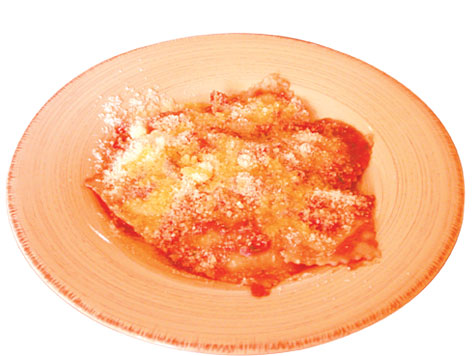
PILLOWS OF FLAVOR Paciarino's ravioli with goat cheese al Pomodoro.
|
One of my earliest culinary memories is of my father bringing home a tin of hard, crisp, almondy Italian cookies. As my sisters and I ate, my father dimmed the lights and put a match to the thin paper wrappers. They began to float like enchanted lanterns. I thought these Italians must be magical. But on my first visit to Italy I went to Milan. There is little magical about Milan, perhaps Italy's least charming city. I was eager to leave, but I thought those cookies were Milanese, so I looked for them. Finally I discovered they were made outside Milan — it is in fact a cookie invented specifically to celebrate leaving Milan for the beauty of the countryside nearby.
| PACIARINO | 468 Fore St, Portland | store open 9:30 am; lunch Mon-Sat 11:30 am-2:30 pm; dinner Wed-Sat 6-9 pm | wine only | Visa/MC/Amex/Disc | 207.774.3500 | paciarino.com |
So escaping Milan, and celebrating with food, is an old tradition. Portland is its most recent beneficiary. The couple that runs Paciarino moved here from Milan last year, began by selling fresh pastas and sauces, and started serving dinners a few months ago. In the spirit of escaping Milan, their restaurant and its cuisine have little in common with their native city. Milan is sleek and image-obsessed. Its food favors butter and rice over pasta and olive oil. But Paciarino has a modest rustic charm and a skill with pasta worthy of Italy's more southern, more welcoming regions.
With its open industrial kitchen, track lights, and yellow-painted brick, Paciarino is not exactly elegant, but it looks nice by candlelight and the colors are warm. The service is attentive and engaging, and it's impossible not to be charmed by the owners or the grandmotherly Italian woman who cleared our plates between courses.
A crostini appetizer allows you to try many of the house-made sauces they sell from their kitchen. The best were a bright red-orange pepper with a sharp initial spice that gave way to sweetness, an artichoke spread that was resonant with the taste of rich olive oil, and a simple spread made from salty dark olives. They deserved a better bread than what they came with, which seemed sliced from a baguette less interesting than the crusty, chewy table bread we had been dipping in oil. A pair of tortas had a flakey, light crust. One had a blended filling of cauliflower and sweet olive oil, while the other, made with carrots, was crunchier and heartier.
Pastas are the house specialty and they do not disappoint. A cannelloni di magro offered thin pasta wrapped around spinach and ricotta. It was all doused in a béchamel, a notoriously difficult sauce that was expertly executed — creamy and rich without a hint of the lumps, graininess, gumminess, or flour taste sometimes found in lesser versions. A thicker pasta with more bite might have given a mushy dish more textural contrast. But the vegetal flavor of fresh spinach held its own through all the sauce.